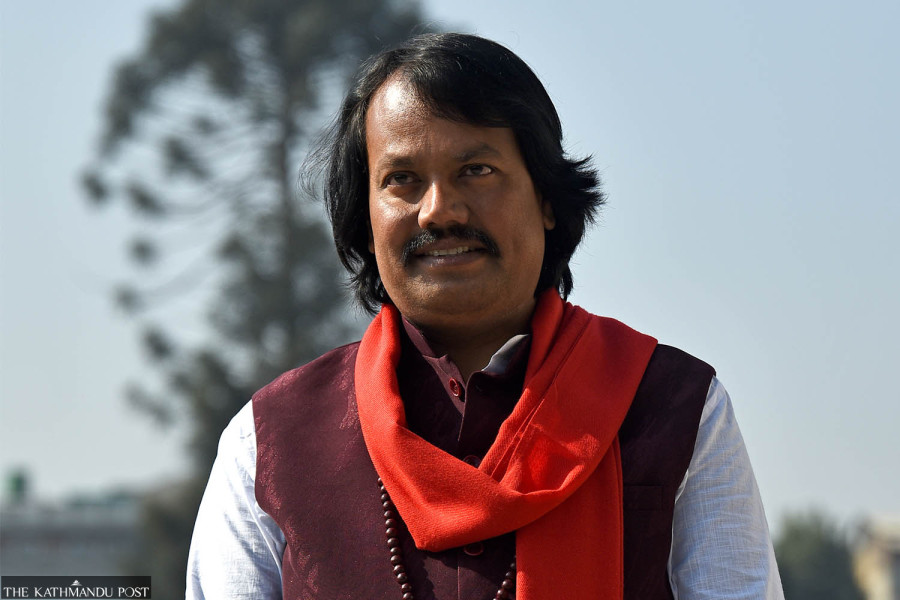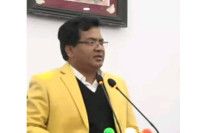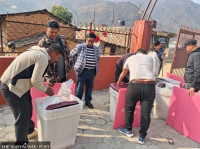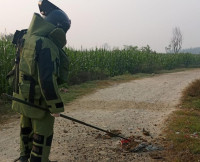National
CK Raut’s oath in ‘Madheshi’ language ruffles feathers
Madheshi Commission writes to Parliament Secretariat seeking a clarification on why some lawmakers were administered the oath in ‘Madheshi’ language.
Nishan Khatiwada
Janamat Party chair CK Raut took the oath of office and secrecy in ‘Madheshi’ language at the swearing-in ceremony on Thursday. It created a flutter—after the Madheshi Commission wrote to the Parliament Secretariat seeking a clarification on why some lawmakers, including Raut were allowed to take oath in ‘Madheshi’ language.
Issuing a statement on Friday, the commission said it is concerned about complaints received from different quarters regarding the oath. The commission also argued that taking oath in a particular language that is not listed among the mother tongues spoken in Nepal will negatively impact other languages.
“As ‘Madheshi’ is not on the lists of official languages prepared by the Language Commission and the Madheshi Commission, House members taking the oath in the language is a matter of serious concern. It has had a bad effect on the listed languages,” the statement read.
Six members from the Janamat Party took their oaths as members of parliament on Thursday.
The Janamat Party leaders have meanwhile lashed out at the Madheshi Commission over its move.
“Madheshi Commission has turned into a commission of certain political party cadres. There was no need to ask for a clarification. The commission should rather be questioned why they sought an unnecessary clarification,” said Chandan Singh, general secretary of Janamat Party.
“How can anyone claiming that their mother tongue is Madheshi and taking an oath in that language amount to disrespecting other languages?” asked Janamat Party leader BP Shah. “The lawmakers have not defamed any language. The commission’s move is faulty.”
So what is a ‘Madheshi’ language?
Shah, the Janamat leader, said many languages in Madhesh are not the same as the language groups in Madhesh that are listed. “To expand it as a lingua franca, we have brought this concept. If a group names a language they speak as a Madheshi language, there is nothing wrong about it,” he said. “The language CK Sir and I speak are not exactly the same as Maithili or other languages spoken in the Madhesh region—there are some differences.”
According to Shah, they named the particular dialect spoken in their area as Madheshi because it is spoken in Madhesh where they live. “Emergence of a new language should not be taken otherwise.”
“The language we learned from our mothers is our mother tongue. The federal parliament had notified that a lawmaker could take their oath in their mother tongue. It had allowed the lawmakers to take oaths in the Madheshi language because we claimed it as our mother tongue,” he said.
Dasharath Dhamala, assistant spokesperson for the Parliament Secretariat, said if a lawmaker claims a particular language to be their mother tongue and requests that they ought to take oath in that language, it is not in their jurisdiction to investigate or test the language.
“It is the responsibility and discretion of the lawmakers. We have no right to say that we will investigate whether it is a proper language or not, if a lawmaker lays his claims,” Dhamala said.
As per the 2011 census, two main languages spoken in Madhesh—Maithali and Bhojpuri—are the second and third most spoken languages in Nepal with 11.7 and 6.7 percent speakers, respectively. In September, 2021, the Language Commission had recommended Maithili, Bhojpuri and Bajjika as the possible languages in government discourse.
In Madhesh Province, 89 languages are spoken. The most spoken language is Maithili followed by Bhojpuri. Bajjika stands third, while Nepali comes fourth in the region. Urdu, Tharu, and Tamang are fifth, sixth and seventh, respectively.
Maithili is spoken especially in Saptari, Siraha, Dhanusha, and Mahottari districts while Bhojpuri is spoken mainly in Bara and Parsa. In Rautahat, Bajjika is the language most widely used. Bajjika is spoken in Dhanusha, Sarlahi, Mahottari, Bara and Rautahat.
Madhesh observers say that CK Raut is trying to be different from others and has not done the right thing to name a dialect as ‘Madheshi’ language.
Commentator Chandra Kishore said that CK Raut was trying to portray himself as different from other traditional Madheshi leaders. “They can term it a language of Madhesh, but ‘Madheshi’ language does not sound proper. Madheshi is not a language because the language they claim is spoken elsewhere too,” he said.
“It is only a ploy to show that he is different from others. If so, can there be a ‘Pahadi’ language as well?”




 24.09°C Kathmandu
24.09°C Kathmandu















